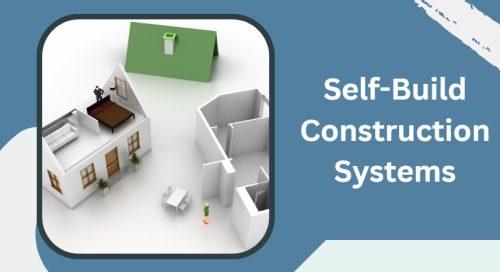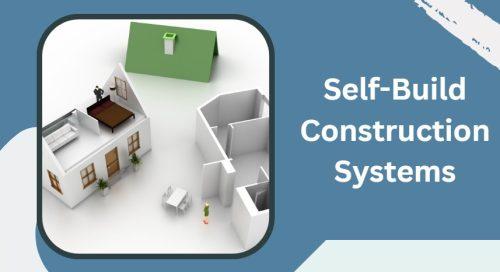|
Getting your Trinity Audio player ready...
|
Building your dream home from scratch is an enticing prospect, isn’t it? Imagine designing every nook and cranny to suit your unique taste and lifestyle. Picture yourself walking through the front door of a house that you built with your own hands, filled with pride and satisfaction.
If this idea has been lingering in the back of your mind, then a self-build project might just be the perfect avenue for turning those dreams into reality. In this blog post, we will delve into the world of self-build in the UK and explore everything you need to know about embarking on this exciting adventure.
From understanding what exactly a self-build project entails to finding funding options, navigating building regulations, and assembling a team – we’ve got you covered. So grab a cuppa and get ready to discover how you can create your very own sanctuary from scratch. Let’s dive in!
Self-Build Your Own Home in the UK
What is a Self Build Project?

What exactly is a self-build project? Simply put, it’s the process of constructing your own home from start to finish. This means that you have complete control over every aspect of the design, layout, and materials used in your dream abode.
Unlike buying an existing property or working with a traditional housebuilder who offers limited customization options, self-build allows you to create a truly unique living space tailored to your preferences. From the architectural style and room layouts to energy-efficient features and smart home technologies – the possibilities are endless.
But don’t be mistaken, embarking on a self-build project doesn’t mean you have to do all the work yourself. Many aspiring self-builders enlist professionals such as architects, contractors, and tradespeople to bring their vision into reality. It’s about assembling a team that will help guide you through each stage of the building process while ensuring compliance with building regulations.
From finding suitable land and obtaining planning permission to managing construction costs and overseeing timelines – there’s no denying that undertaking a self-build project requires careful planning and organization. However daunting it may seem at first glance, remember that this journey is also filled with immense rewards and satisfaction when you finally step foot into your very own creation.
So if designing every aspect of your dream home sounds like an exciting adventure for you, then buckle up because we’re about to explore everything there is to know about embarking on a self-build project in the UK!
Is Self-Build Right for Me?

Building your own home can be an exciting and rewarding endeavour, but it’s not for everyone. Before embarking on a self-build project, there are several factors to consider.
Do you have the time and commitment required? Self-building requires significant involvement throughout the entire process – from finding land to managing contractors and overseeing construction. If you’re short on time or prefer a more hands-off approach, self-building may not be the best option for you.
Assess your budget and financial situation. While self-build projects can offer cost savings in some cases, they also come with their own set of expenses. You’ll need sufficient funds to cover land acquisition, planning permission fees, materials, labor costs, and unforeseen expenses that may arise during construction.
Next, think about your skills and knowledge in building trades. Do you have experience or expertise in areas such as design, project management or construction? If not, hiring professionals like architects or builders will be essential to ensure the success of your project.
Additionally, consider your long-term plans. Are you planning to stay in this property for many years? If so, self-building allows you to create a home tailored specifically to your needs, which could potentially save money on future renovations or upgrades.
Lastly, assess whether you’re comfortable with uncertainty and problem-solving. Self-builds can present unexpected challenges along the way – from planning delays to supply chain issues – which require flexibility and resilience. Overall, building your own home through a self-build project is an exciting opportunity that offers numerous benefits. However, it’s crucial to carefully evaluate your individual circumstances before making a decision to ensure that self-building is right for you!
How do you Fund a Self-build?

How do you fund a self-build project? This is one of the most pressing questions for anyone considering building their own home. The good news is that there are several options available to help finance your dream home.
One option is to use your savings or equity from an existing property. This can be a great way to start, as it means you won’t have to rely on borrowing large sums of money. However, not everyone has enough savings or equity to cover the cost of a self-build.
Another option is to take out a self-build mortgage. These mortgages work differently from traditional mortgages, as the funds are released in stages throughout the construction process. This can help manage cash flow and ensure that you have enough money at each stage of the build.
If you don’t qualify for a self-build mortgage or need additional funding, there are other financing options available. Some people choose to borrow from family or friends, while others may explore government grants and incentives specifically designed for self-builders.
It’s important to note that securing funding for a self-build project can sometimes be more challenging than obtaining finance for buying an existing property. Lenders often view self-builds as higher risk due to factors such as potential delays and cost overruns.
To increase your chances of securing funding, it’s essential to have a well-researched and detailed plan in place. This includes having realistic cost estimates, obtaining planning permission before approaching lenders, and demonstrating your ability to manage the project effectively.
Finding suitable financing will depend on your individual circumstances and financial situation. It’s always recommended to seek advice from financial experts who specialize in self-builds and explore all available options before making any decisions.
How Much Does it Cost to Self-Build?

When it comes to self-building your own home in the UK, one of the most pressing questions on your mind is likely to be: how much will it cost? Well, the answer is not so straightforward. The cost of a self-build project can vary greatly depending on various factors such as location, size, design complexity, and choice of materials.
On average, you can expect the cost to fall within the range of £1,000 and £3,000 per square meter. However, please note that this is just a general estimate and prices can fluctuate significantly.
To get a more accurate idea of how much your self-build will cost, it’s essential to consider all aspects involved. This includes calculating costs for land acquisition (if not already owned), planning permission fees, architectural services (if required), construction materials and labour costs.
It’s also worth noting that self-build projects have the potential to offer better value for money compared to buying an existing property outright from a developer or estate agent. It’s important to factor in additional expenses such as legal fees and utilities connections which may add up along with any unexpected surprises during construction.
Ultimately though if done right investing time into researching financing options like custom-build or traditional self-build mortgages could make building your dream home an option even for first-time buyers looking for something truly unique! So why not take control of your future living space today by exploring what opportunities await when you choose self-building over buying off-the-shelf?!
Is Self-Build Cheaper Than Buying?

When it comes to building your own home, one of the first questions that often comes to mind is whether self-build is cheaper than buying an existing property. The answer is not simple yes or no. On average, a well-managed self-build project can yield a profit of 25%, meaning you could potentially get more houses for your money if you choose to build rather than buy.
However, it’s important to note that self-build mortgages are not as widely available as traditional mortgages for buying existing properties. This means that there may not be suitable mortgage products offered for everyone’s financial situation, making the traditional self-build route unfeasible for many first-time buyers in terms of both time and financial input.
But fear not! If embarking on a full-scale self-build isn’t viable for you, there’s still another option worth considering – custom build. Custom building removes some of the obstacles faced by individual self-builders, such as finding land, securing planning permission, and connecting services to the site. It offers a more hands-off approach while still providing an opportunity to create an individual home tailored to your needs.
Custom-built sites are typically managed by developers who can provide more information on the financial requirements involved in this alternative route. So even if traditional self-building seems out of reach financially or logistically, exploring custom-build options may just be the solution you need to turn your dream home into reality.
Remember, building your own home allows greater control over design choices and customization possibilities compared to purchasing an already-built property. While it may require careful consideration and research into financing options like custom-build schemes or specialist lenders offering bespoke mortgage packages tailored specifically towards self-build – taking these factors into account will help ensure that undertaking a self-build project truly becomes a rewarding experience!
What Self-Build Construction Systems are Available?

When it comes to self-build projects in the UK, there are a variety of construction systems available for aspiring homeowners. The choice of construction system will greatly depend on your budget, design preferences, and desired level of involvement in the building process.
One popular self-build construction system is a timber frame. This involves using prefabricated panels made from sustainably sourced timber. Timber frame construction offers excellent insulation properties and can be erected quickly, making it an attractive option for those looking to complete their project efficiently.
Another option is brick-and-block construction, which is a more traditional method. This involves using bricks as the external cladding and concrete blocks for internal walls. Brick and block construction provides durability and soundproofing but may require more time and skilled labour during the building process.
For those seeking a more eco-friendly approach, there are also alternative systems such as straw bale or rammed earth construction. These methods utilize natural materials that offer excellent insulation properties while reducing environmental impact.
Furthermore, modular or kit homes are becoming increasingly popular in the self-build market. These homes come pre-designed with ready-made components that can be assembled on-site like a jigsaw puzzle. Modular homes offer cost-effective solutions with shorter build times compared to traditional methods.
Choosing the right construction system depends on your personal preferences, budget constraints, and sustainability goals for your self-build project. Consulting with professionals in the field can help you make an informed decision based on your specific needs
How can You Find a Team for Your Self Build?

Finding the right team to help you with your self-build project is crucial. Whether you’re a seasoned DIY enthusiast or have limited construction experience, having a reliable and skilled team by your side can make all the difference.
Consider what skills you already possess and what areas you may need assistance with. Do you have any friends or family members who are experienced in construction? They could be valuable assets to your team. Additionally, reach out to local trade organizations or online forums to connect with professionals who specialize in self-build projects.
Next, take the time to interview potential team members. Ask for the references and examples of their previous work. It’s important to find individuals who not only have the necessary skills but also share your vision for your dream home.
When assembling your team, remember that communication is key. Ensure that everyone is on the same page from the start regarding timelines, budget constraints, and expectations. Regular meetings and clear channels of communication will help keep things running smoothly throughout the project.
Don’t forget about legal considerations such as insurance and contracts. Protect yourself by ensuring that all members of your team are properly insured and that contracts are in place outlining responsibilities and payment terms.
By taking these steps to find a reliable and skilled team for your self-build project, you’ll be well on your way to creating the home of your dreams!
Do I Need an Architect for a Self-Build?

When embarking on a self-build project, one question that often arises is whether or not you need an architect. While it ultimately depends on your individual circumstances and preferences, having an architect can be extremely beneficial.
An architect brings expertise and professional knowledge to the table. They have the skills to design a home that not only meets your needs but also complies with building regulations. They can assess the feasibility of your ideas, make recommendations for improvements, and ensure that your vision becomes a reality.
Moreover, architects are experienced in managing the entire construction process. From obtaining planning permission to overseeing contractors and suppliers, they take care of all the logistical aspects so you can focus on other important tasks.
Additionally, working with an architect means gaining access to their network of trusted professionals in various fields. This includes structural engineers, interior designers, and landscape architects who can contribute valuable insights to enhance your self-build project.
While hiring an architect does come at a cost, their expertise and guidance throughout the process can save you time, money, and potential headaches down the line.
Self Build and Building Regulations in the UK

When embarking on a self-build project in the UK, it is crucial to understand and adhere to the building regulations. These regulations are essential to ensure that your home meets safety standards and complies with legal requirements.
Building regulations cover various aspects of construction, including structural integrity, fire safety, energy efficiency, ventilation, and accessibility. It is important to consult local authorities or building control officers who can provide guidance on specific requirements for your area.
One key aspect of building regulations is obtaining planning permission. Before you begin any construction work, you must obtain approval from the local planning authority. This involves submitting plans and specifications for review.
Throughout the construction process, inspections will be carried out by building control officers to ensure compliance with the approved plans. These inspections may occur at various stages of construction, such as foundations, walls, roofing systems, electrical installations, and plumbing.
Additionally, building regulations also consider factors such as sound insulation between rooms and neighbouring properties to enhance privacy and reduce noise pollution.
It’s worth noting that failure to comply with building regulations can result in penalties or even demolition orders if significant non-compliance is identified after completion.
Therefore it’s crucially important to engage professionals like architects or project managers who have expertise in navigating these regulatory requirements throughout your self-build journey. Their knowledge will help streamline the process while ensuring compliance with all relevant rules and guidelines.
By following these guidelines carefully during your self-build project in the UK ensures not only a safe living environment but also helps maintain property value over time – an investment well worth making!
How Long Does it Take to Self-Build?

One of the most common questions people have when considering a self-build project is how long it will take. The truth is, there isn’t a one-size-fits-all answer to this question as the timeline for self-building can vary greatly depending on several factors.
The complexity of your design and the size of your home will play a significant role in determining how long it takes to complete your self-build. A small, simple design may be completed in a matter of months, while a larger, more intricate project could take over a year.
Additionally, the availability and coordination of tradespeople and suppliers can impact the timeline. It’s important to factor in potential delays or unforeseen challenges that may arise during construction.
Another consideration is whether you are managing the project yourself or hiring a contractor. Managing it yourself requires more time and effort on your part but can potentially save money. Hiring a contractor may speed up the process but comes with additional costs.
Obtaining necessary permits and approvals from local authorities can also affect the timeframe for your self-build. It’s essential to ensure all necessary paperwork is submitted correctly and promptly.
In conclusion (without using those words), while there is no definitive answer to how long it takes to self-build, careful planning and organization can help streamline the process.
Conclusion
In conclusion, embarking on a self-build journey offers individuals the opportunity for creativity and personalization when it comes to their homes. While it may require significant financial investment and dedication throughout the process, building your own home can ultimately provide immense satisfaction knowing that you have created a living space perfectly suited to your needs. So whether you choose traditional self-build or explore alternatives like custom builds sites managed by developers – take that leap into creating something truly unique!








